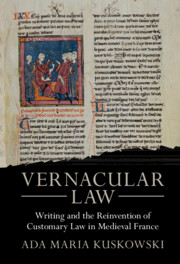Book contents
- Vernacular Law
- Studies In Legal History
- Vernacular Law
- Copyright page
- Dedication
- Contents
- Figures
- Acknowledgments
- A Note on the Text
- Introduction Vernacular Writing and the Transformation of Customary Law in Medieval France
- Part I Written Custom and the Formation of Vernacular Law
- 1 What Is Custom? Concept and Literary Practice
- 2 Composing Customary Law as a Vernacular Law
- 3 Writing a ‘ius non scriptum’: Writtenness, Memory, and Change
- Part II Political and Intellectual Tensions
- Part III Implications
- Conclusion Lasting Model and Professional Community
- Bibliography
- Index
3 - Writing a ‘ius non scriptum’: Writtenness, Memory, and Change
from Part I - Written Custom and the Formation of Vernacular Law
Published online by Cambridge University Press: 27 October 2022
- Vernacular Law
- Studies In Legal History
- Vernacular Law
- Copyright page
- Dedication
- Contents
- Figures
- Acknowledgments
- A Note on the Text
- Introduction Vernacular Writing and the Transformation of Customary Law in Medieval France
- Part I Written Custom and the Formation of Vernacular Law
- 1 What Is Custom? Concept and Literary Practice
- 2 Composing Customary Law as a Vernacular Law
- 3 Writing a ‘ius non scriptum’: Writtenness, Memory, and Change
- Part II Political and Intellectual Tensions
- Part III Implications
- Conclusion Lasting Model and Professional Community
- Bibliography
- Index
Summary
Unwritten law, or ius non scriptum, was a prominent definition of custom in the later medieval period developed especially in learned circles. Though ‘written custom’ should be a contradiction, this was unevenly perceived. Unlike the authors of the Glanvill and Bracton lawbooks in England, the coutumier authors did not seek to understand or legitimate their writing of custom within this learned framework. Those coutumier authors who addressed the question of writenness viewed the idea of ‘written custom’ as unproblematic. Instead, they saw writtenness and its lack through a practical lens, as an aspect of custom’s potential to be retained in memory. This does not mean they viewed written custom as ‘fixed’. Writing in a time of fundamental legal change, they understood that even the custom expressed in written text was mutable. While writing custom could help to keep it memory, it was potentially changeable in future versions of the text.
- Type
- Chapter
- Information
- Vernacular LawWriting and the Reinvention of Customary Law in Medieval France, pp. 126 - 152Publisher: Cambridge University PressPrint publication year: 2022

